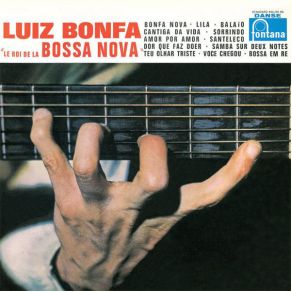Le Roi de la Bossa Nova (The King of Bossa Nova)
Download links and information about Le Roi de la Bossa Nova (The King of Bossa Nova) by Luiz Bonfá / Luiz Bonfa. This album was released in 1963 and it belongs to Latin genres. It contains 16 tracks with total duration of 38:33 minutes.

|
|
|---|---|
| Artist: | Luiz Bonfá / Luiz Bonfa |
| Release date: | 1963 |
| Genre: | Latin |
| Tracks: | 16 |
| Duration: | 38:33 |
| Buy it NOW at: | |
| Buy on iTunes $9.99 | |
Tracks
[Edit]| No. | Title | Length |
|---|---|---|
| 1. | Bonfa Nova | 2:09 |
| 2. | Cantiga da Vida | 2:00 |
| 3. | Amor por Amor | 2:23 |
| 4. | Dor Que Faz Doer | 2:02 |
| 5. | Samba de Duas Notas | 3:14 |
| 6. | Teu Olhar Triste | 2:27 |
| 7. | Lila | 2:30 |
| 8. | Voce Chegou | 2:26 |
| 9. | Santeleco | 2:23 |
| 10. | Balaio | 2:38 |
| 11. | Sorrindo | 2:09 |
| 12. | Bossa Em Re | 1:34 |
| 13. | Voce Chegou (Instrumental) | 2:32 |
| 14. | Saudade Vem Correndo | 2:49 |
| 15. | Mania de Maria | 2:35 |
| 16. | Sincopado Triste | 2:42 |
Details
[Edit]While it's true that Luiz Bonfá is a forgotten name among many bossa nova lovers — past and present — a forgotten name rarely associated with his younger peers he influenced (Jobim, Gilberto, de Moraes) who took the music to international popularity. Bonfá is a ghost whose shadow looms large over the music, whether he is well known or not. He composed both main themes for Black Orpheus, which ended up on the hit soundtrack. Here Bonfá does what he does best: play an amazing guitar, arrange a series of uncredited session players, sing, and dig deep into the roots of bossa nova as it comes out of samba, but then return it changed but folded into the tradition. Tracks like "Samba de Duas Notas" ("Two Note Samba"), with its beautiful guitar/flute front line slipping around and through one another in the bridge, are typical of this man's artistry and innovative. The gorgeous ballad "Lila" offers a portrait of Bonfá the balladeer. His deep, fluid fingerpicking style colors each melodic phrase, shades the changes, and offers a harmonic and technical invention that guitarists like Tal Farlow would kill for. "Sudade Vem Correndo" comes off like a jazz tune with a horn section upfront and Bonfá leading the rhythm section, which includes a piano. He may get lost a little in the mix, which is ancient, but he's there setting the deep groove in the tune. His comping behind the pianist's solo actually gives him a wider palette to improvise upon. Ultimately, this is a beautiful set, one that singularly displays many but not all of Bonfá's gifts. It is deep bossa, but its airiness, light, and song-like qualities equal its technical excellence, and make it accessible to anyone interested in the music. [A Sunnyside reissue of the album added a four-cut EP called En Direct du Bresil ("Direct from Brazil"), recorded and issued the same year as the LP program, 1963.]